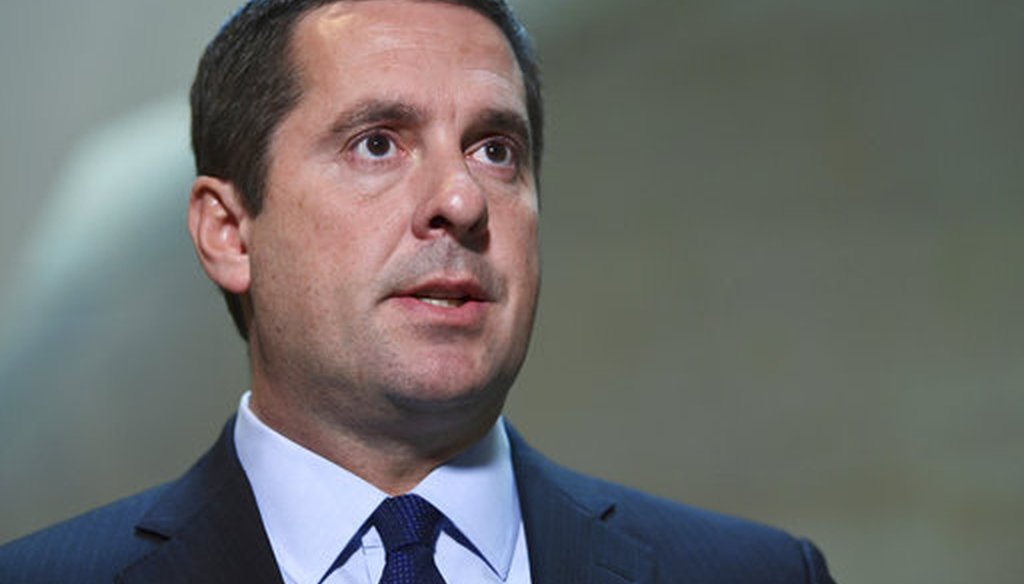Get PolitiFact in your inbox.

House Intelligence Committee Chairman Rep. Devin Nunes, R-Calif., speaking on Capitol Hill in Washington Oct. 24, 2017. (AP Photo/Susan Walsh)
Republicans on the House Intelligence Committee released a memorandum accusing the Justice Department and FBI of abusing their authority in the early stages of an investigation into collusion between Russia and Donald Trump’s presidential campaign.
Republican committee members believe the memo’s release will expose political bias surrounding law enforcement officials’ decision, in the throes of the 2016 presidential election, to obtain a wiretap on a former Trump campaign adviser.
The memo's authors claim their findings "represent a troubling breakdown of legal processes established to protect the American people from abuses" related to procedures the government must follow to get surveillance approval.
We reviewed the memo and found that it makes a largely one-sided case that appears to bolster the Trump administration’s efforts to undercut the Russia probe. Critics charge that the memo cherry-picks information to portray law enforcement in an unflattering light, while leaving out facts that would create a different impression.
Here, we’ll review the memo’s contents while adding context and laying out the arguments.
The GOP memo claims that officials selectively withheld information when they obtained a warrant to monitor Carter Page, a former Trump campaign associate suspected of working as a Russian agent.
While an adviser to the campaign, Page traveled to Moscow in July 2016, when he met with Russia’s deputy prime minister and a high-ranking Russian oil official. Page reported back to Trump campaign staffers in an email that the deputy prime minister had "expressed strong support for Mr. Trump," and that he had gleaned "incredible insights and outreach" in Russia.
Page had been on the U.S. counterintelligence radar as early as 2013, but his Moscow visit played a major role in persuading the FBI to investigate connections between Russia and Trump’s campaign, according to the New York Times.
After convincing a Foreign Intelligence Surveillance Court judge that there was probable cause to believe Page was acting as an agent of a foreign power, the FBI and Justice Department obtained a warrant to target Page’s communications sometime after he parted ways with the campaign in August 2016.
According to the GOP House memo, law enforcement officials failed to disclose to the intelligence court that their warrant application relied on a dossier compiled by former British intelligence officer Christopher Steele on behalf of Fusion GPS, a research firm whose work had been funded in part by the Democratic National Committee and Hillary Clinton’s presidential campaign.
However, the contents of the Steele dossier would have been insufficient to meet the court’s probable cause standard, according to the New York Times, citing unnamed sources familiar with the warrant application. These sources said "the application drew on other intelligence material that the Republican memo selectively omits."
California Rep. Adam Schiff, the top Democrat on the House Intelligence Committee, said Republican committee members’ decision to release the memo was an effort "to politicize the intelligence process."
"In order to understand the context in which the FBI sought a FISA warrant for Carter Page, it is necessary to understand how the investigation began, what other information the FBI had about Russia’s efforts to interfere with our election, and what the FBI knew about Carter Page prior to making application to the court – including Carter Page’s previous interactions with Russian intelligence operatives," Democratic members of the House Intelligence Committee said in a statement following the memo's release.
The House Intelligence Committee voted Jan. 29 along party lines to release the memo over objections from the Justice Department that making its contents public would be "extraordinarily reckless."
Following the vote, the Trump administration had five days to consider whether to approve or block the memo’s release, during which law enforcement officials vigorously appealed to the White House to keep the memo under wraps.
Hours before the White House declassified the memo on Feb. 2, Trump took to Twitter to repeat his attacks on top FBI and Justice Department officials.
"The top Leadership and Investigators of the FBI and the Justice Department have politicized the sacred investigative process in favor of Democrats and against Republicans - something which would have been unthinkable just a short time ago," Trump tweeted.
The top Leadership and Investigators of the FBI and the Justice Department have politicized the sacred investigative process in favor of Democrats and against Republicans - something which would have been unthinkable just a short time ago. Rank & File are great people!
— Donald J. Trump (@realDonaldTrump) February 2, 2018
Ahead of the memo's release, the FBI issued a public statement that said the bureau takes its obligations to the surveillance court seriously, and warned that the memo paints a distorted picture of how the surveillance warrant was obtained.
"The FBI was provided a limited opportunity to review this memo the day before the committee voted to release it," read the Jan. 31 statement. "As expressed during our initial review, we have grave concerns about material omissions of fact that fundamentally impact the memo's accuracy."
Our Sources
Wall Street Journal, "Former Trump Aide Carter Page Was on U.S. Counterintelligence Radar Before Russia Dossier," Feb. 1, 2018
New York Times, "Trump Adviser’s Visit to Moscow Got the F.B.I.’s Attention," April 19, 2017
Washington Post, "FBI obtained FISA warrant to monitor Trump adviser Carter Page," April 11, 2017
New York Times, "Court Approved Wiretap on Trump Campaign Aide Over Russia Ties," April 12, 2017
New York Times, "House Republicans Vote to Release Secret Memo on Russia Inquiry," Jan. 29, 2018
New York Times, "F.B.I. Condemns Push to Release Secret Republican Memo," Jan. 31, 2018
PolitiFact, "What you need to know about newly revealed Trump campaign-Russia ties," Nov. 9, 2017
Testimony of Carter Page, House Intelligence Committee, Nov. 2, 2017
Rep. Adam Schiff, D-Calif., in the Washington Post, "Rep. Nunes’s memo crosses a dangerous line," Jan. 31, 2018


 PolitiFact Rating:
PolitiFact Rating: 











































